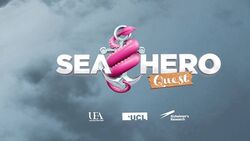Software:Sea Hero Quest
Lua error in Module:Effective_protection_level at line 16: attempt to index field 'FlaggedRevs' (a nil value).
| Sea Hero Quest | |
|---|---|
 | |
| Developer(s) | Glitchers |
| Release |
|
Sea Hero Quest is a mobile game which contributes to research on dementia. It was designed by independent British game company Glitchers in 2016 in association with Alzheimer's Research UK, University College London and the University of East Anglia and with funding from Deutsche Telekom.[1][2][3] The idea for the game came from neuroscientist Michael Hornberger of the University of East Anglia who collaborated with Hugo Spiers of University College London, Antoine Coutrot of CNRS and a group of six other neuroscientists.[4]
The game was designed to help researchers to understand the mental process of 3D navigation, which is one of the first skills lost in dementia. It was hoped that a large number of people would play the game, thus contributing much more data than could easily be obtained in a laboratory experiment.[5]
In August 2017, a virtual reality edition of the game was released.[6]
Gameplay
The plot of the game involves a sea journey taken by a son in a quest to recover the memories his father has lost to dementia. There are three sections: navigation, shooting flares to test orientation, and chasing creatures. Each has been "carefully crafted to be as fun and exciting as it is scientifically valid".[7]
Reception
It was named "App of the week" by BT.[8] It won nine Cannes Lions at the 2016 International Festival of Creativity.[9]
By February 2017, the game had been downloaded 2.7 million times.[9] By October 2021 it had been played by 4.3 million players for a total of 117 years, yielding data which would have taken 17,600 years to produce using conventaional lab methods.[10]
The game was nominated for the 2018 British Academy Games Awards, in the new category "Game Beyond Entertainment" for games which "deliver a transformational experience beyond pure entertainment".[11] At the 2018 Webby Awards, it won the award for "Social Impact".[12] It was also nominated for the Coney Island Dreamland Award for Best AR/VR Game at the 2020 New York Game Awards.[13]
Further work
The game is no longer available to individuals, but can be used as part of new research projects.[14][15]
The game was used in research into the influence of childhood environment on navigation ability; it was found that "growing up outside cities appears to be good for the development of navigational abilities, and this seems to be influenced by the lack of complexity of many street networks in cities", while "the countryside is a rather complex environment in that it is very unorganised, with greater distances, meaning you have to memorise your route". The researchers developed a variant of the game, City Hero Quest, to test how well city-dwellers got on in cities.[16][17]
References
- ↑ "Partners". http://www.seaheroquest.com/en/credits. Retrieved 5 May 2016.
- ↑ Titcomb, James (4 May 2016). "Playing this smartphone game can help fight dementia". The Telegraph. https://www.telegraph.co.uk/technology/2016/05/04/playing-this-smartphone-game-can-help-fight-dementia/.
- ↑ "Sea Hero Quest". 24 January 2022. https://glitchers.com/project/sea-hero-quest/.
- ↑ Kaplan, Sara (7 May 2016). "Two minutes playing this video game could help scientists fight Alzheimer's". Washington Post. https://www.washingtonpost.com/news/speaking-of-science/wp/2016/05/07/two-minutes-playing-this-video-game-could-help-scientists-fight-alzheimers/. Retrieved 8 May 2016.
- ↑ "Mobile game Sea Hero Quest 'helps dementia research'". BBC News. 4 May 2016. https://www.bbc.co.uk/news/technology-36203674. Retrieved 5 May 2016.
- ↑ Rigg, Jamie (30 August 2017). "'Sea Hero Quest' hides dementia research inside a VR game". Engadget. https://www.engadget.com/2017/08/30/sea-hero-quest-vr/. Retrieved 8 December 2017.
- ↑ "The Science Behind the Game". http://www.seaheroquest.com/en/gallery. Retrieved 5 May 2016.
- ↑ "App of the week: Sea Hero Quest - the mobile game that is fighting dementia". BT. 6 May 2016. http://home.bt.com/tech-gadgets/tech-news/app-of-the-week-sea-hero-quest-11364058331447. Retrieved 8 May 2016.
- ↑ 9.0 9.1 Jordan, Lucy (27 February 2017). "Navigating dementia: researchers at UCL are casting a new light on dementia through a mobile phone game with 2.7 million players". University College London. https://medium.com/ucl-antenna/navigating-dementia-65a233d43bb8#.2cnoazg7x. Retrieved 28 February 2017.
- ↑ "Sea Hero Quest relaunches as a new Research Edition". Glitchers. 12 October 2021. https://www.glitchers.com/blog/sea-hero-quest-research-edition.
- ↑ Makedonski, Brett (12 April 2018). "BAFTA names What Remains of Edith Finch its best game of 2017". Destructoid. https://www.destructoid.com/bafta-names-what-remains-of-edith-finch-its-best-game-of-2017-498392.phtml. Retrieved 13 April 2018.
- ↑ "2018 Winners". The Webby Awards. 24 April 2018. https://www.webbyawards.com/winners/2018/. Retrieved 30 June 2018.
- ↑ Sheehan, Gavin (2 January 2020). "The New York Game Awards Announces 2020 Nominees". Bleeding Cool. https://www.bleedingcool.com/2020/01/02/the-new-york-game-awards-announces-2020-nominees/. Retrieved 4 January 2020.
- ↑ "Sea Hero Quest". https://www.alzheimersresearchuk.org/research/for-researchers/resources-and-information/sea-hero-quest/.
- ↑ "Sea Hero Quest – game for good" (in en). Deutsche Telekom. https://www.telekom.com/en/corporate-responsibility/corporate-responsibility/sea-hero-quest-game-for-good-587134.
- ↑ Coutrot, A.; Manley, E.; Goodroe, S.; Gahnstrom, C.; Filomena, G.; Yesiltepe, D.; Dalton, R. C.; Wiener, J. M. et al. (30 March 2022). "Entropy of city street networks linked to future spatial navigation ability". Nature 604 (7904): 104–110. doi:10.1038/s41586-022-04486-7. ISSN 0028-0836. PMID 35355009. Bibcode: 2022Natur.604..104C. https://hal.archives-ouvertes.fr/hal-03627470/file/Coutrot_2022_SHQEnvironment.pdf. Downloadable preprint
- ↑ "People raised in rural areas have better sense of direction than city dwellers – study". The Guardian. Agence France-Presse. 30 March 2022. https://www.theguardian.com/science/2022/mar/30/people-raised-in-rural-areas-have-better-sense-of-direction-than-city-dwellers-study.
External links
 |
